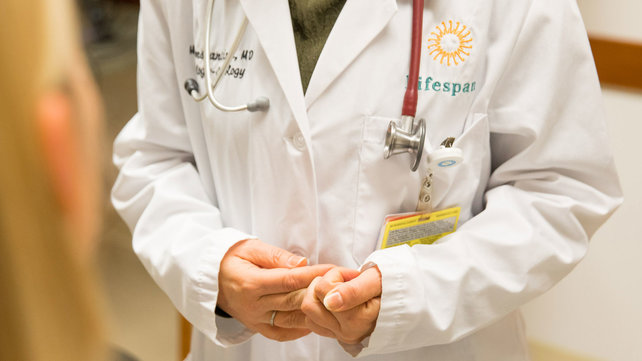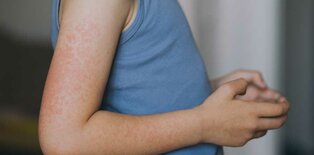Chickenpox: What Parents Need to Know

Chickenpox, an infection caused by the varicella-zoster virus, is most associated with fever and an itchy rash.
Before a vaccine was introduced in 1995, chickenpox was a common childhood illness in the United States. Fortunately, since the development of a vaccine, the incidence of chickenpox has decreased significantly.
The signs and symptoms of chickenpox
- Chickenpox typically starts with a fever, followed by symptoms such as fatigue, headache, sore throat, runny nose, or cough
- A rash develops typically within a day and looks like groups of small, itchy, red bumps
- These spots evolve into small, fluid-filled sacs (vesicles) that eventually scabs or crust
- Multiple "crops" of vesicles continue to appear over several days, resulting in red bumps, vesicles, and scabs all happening simultaneously
- The illness typically lasts five to ten days
Is chickenpox contagious?
Chickenpox is highly contagious. It can be spread in the air from coughing or sneezing.
The most contagious period occurs while the rash is spreading, but a person may also be contagious two days before the rash appears. A person with chickenpox is no longer contagious once all the vesicles have crusted over and no new vesicles are forming.
Who is at risk?
Anyone who has not previously had chickenpox or is not vaccinated can become infected, but some people are at higher risk for severe complications if they become sick.
Those most at risk include:
- Pregnant people
- Newborns born to mothers who have chickenpox
- People with weakened immune systems
What are some possible complications of chickenpox?
For most healthy children, chickenpox is a mild disease, and serious complications are rare. However, complications that may occur include severe skin infections, scarring, pneumonia, brain inflammation (encephalitis), or even death. Children who have had chickenpox may develop shingles later in life, which is a painful reactivation of the varicella virus.
How is chickenpox treated?
For most people, treatment of chickenpox is aimed at relieving symptoms such as fever and itching.
Healthcare providers might prescribe an antiviral medicine like acyclovir for people with chickenpox who are at risk for more serious illness. Your provider can tell you if medicine is needed for your child.
Caring for a child with chickenpox
Parents can take several steps to manage chickenpox:
- Prevent scratching: Encourage your child not to scratch the blisters, as this can lead to bacterial infections, scarring, and more discomfort.
- Trim nails: Keep your child’s nails trimmed to prevent damage to the skin from scratching.
- Relieve itching: Oatmeal baths or over-the-counter antihistamines can help soothe itching.
- Manage fever: Do not give aspirin to children with chickenpox due to the risk of Reye syndrome, a rare but serious condition that affects the liver and brain. Use acetaminophen or ibuprofen to manage fever.
When to see a healthcare provider
Most cases of chickenpox do not require a healthcare visit. However, you should contact your child’s provider if they have:
- Fever that lasts for more than four days
- Severe cough or trouble breathing
- Rash that becomes red, warm, swollen, or painful
- A severe headache or neck stiffness
- Seems very ill
If you bring your child to a healthcare clinic, let the office know ahead of time that your child might have chickenpox. This can help protect other children at the clinic.
Preventing chickenpox with the vaccine
The chickenpox vaccine is highly effective at preventing varicella infection. If someone who has been vaccinated does get chickenpox, it is usually a much milder case, with fewer blisters, lower fever, and a quicker recovery.
The CDC recommends that all healthy children receive two doses of the chickenpox vaccine:
- The first dose at age 12 to 15 months
- The second dose at age four to six years
- People over the age of six years who have never been vaccinated or had the chickenpox, should also receive two doses of the vaccine
Because the vaccine contains a weakened live virus, it is generally not recommended for pregnant people or immunocompromised individuals.
The risks of chickenpox vaccination
Most people experience only mild side effects, such as soreness or swelling at the injection site, mild rash, or fever. While it is possible for vaccinated individuals to transmit the virus to others in rare cases, this is highly unusual. Severe reactions to the vaccine are very rare.
A safer future
Chickenpox was once almost considered a rite of passage for children, but thanks to the availability of the vaccine, the incidence of the disease has dramatically decreased. Ensure that your child is vaccinated to protect them from chickenpox and its potential complications.
If you suspect your child has chickenpox, contact their healthcare provider. For more information on chickenpox and other childhood infections, visit the CDC website or the American Academy of Pediatrics' website healthychildren.org.
About the Author:
Kirsten d'Hemecourt, MD
Dr. Kirsten d'Hemecourt is a pediatric infectious diseases fellow at Hasbro Children's. Her interests include public health and epidemiology.
Find a Doctor

The right provider is in our network
Search more than 1,200 providers in our network.



